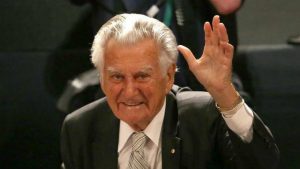Home » Commentary » Opinion » A tribute to Bob Hawke
· IDEAS@THECENTRE

 A striking fact about Bob Hawke is that nearly three decades after he left office, so many people still don’t comprehend the reasons for his success. Already, the tributes have stressed his many personal virtues: his larrikinism, his optimism, his union background, his skills as a great orator and his record as our nation’s longest serving Labor prime minister.
A striking fact about Bob Hawke is that nearly three decades after he left office, so many people still don’t comprehend the reasons for his success. Already, the tributes have stressed his many personal virtues: his larrikinism, his optimism, his union background, his skills as a great orator and his record as our nation’s longest serving Labor prime minister.
These were all essential to the man and to his achievement, but they were not sufficient. Hawkie, as he was affectionately known, was the most consequential prime minister in the post-World War Two era because of his economic ideas. His prime ministership, from 1983 to 1991, was at root about saving a nation that was heading toward economic decline.
Hawke came to power at a time when the ‘Australian Settlement’ – as distinguished journalist Paul Kelly describes the foundational principles of Australian nationhood – was morally and intellectually spent. Since independence from Britain in 1901, big government had manifested itself in various ways: import protection to guarantee domestic profits and an arbitration system to stand between capital and labour by guaranteeing a share of the protected pie for workers. Not surprisingly, this stifled our nation’s development; and by the early 1980s, Australia was economically insular, bogged down by protectionism, over-regulation and chronic inflation.
That all changed in the 1980s when Hawke’s government – a Labor government – floated the Aussie dollar, reduced import tariffs, and deregulated the financial system, as well as state-run industries such as aviation and telecommunications. Hawke and his treasurer Paul Keating, backed by John Howard in Opposition, set out to convert our protectionist mentality to the idea that our living standards depended on our ability to trade our way in the global marketplace.
From this idea flowed lower taxes, reduced union power and budgetary and low inflation discipline. As a consequence, Australia has enjoyed an unparalleled period of prosperity for the past quarter century. As I argued in the AFR this week: just think how the old Australia – the over-regulated, highly unionised and inflation-prone country of the 1970s – would have weathered global financial storms.
All of this was not merely the work of one man. The economic reforms he implemented had been percolating in think tanks such as CIS for several years. This was also the era of Reagan and Thatcher. Still, in the broader historical sweep, the Hawke economic reform agenda saved Australia from the Argentinian road to ruin.
Its success sent a lesson to the world about the utility of market-oriented economic reforms. For that, Hawke deserves plenty of thanks and praise.
A tribute to Bob Hawke